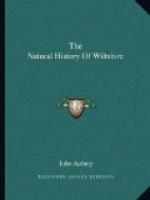Sheep. As to the nature of our Wiltshire
sheep, negatively, they are not subject to the shaking;
which the Dorsetshire sheep are. Our sheep about
Chalke doe never die of the rott. My Cos.
Scott does assure me that I may modestly allow a thousand
sheep to a tything, one with another. Mr. Rogers
was for allowing of two thousand sheep, one with another,
to a tything, but my Cosin Scott saies that is too
high.
___________________________________
Shepherds. The Britons received their knowledge of agriculture from the Romans, and they retain yet many of their customes. The festivalls at sheep-shearing seeme to bee derived from the Parilia. In our western parts, I know not what is done in the north, the sheep-masters give no wages to their shepherds, but they have the keeping of so many sheep, pro rata; soe that the shepherds’ lambs doe never miscarry. I find that Plautus gives us a hint of this custome amongst the Romans in his time; Asinaria, Act iii. scene i. Philenian (Meretrix):
"
Etiam opilio, qui pascit (mater) alienas ovis,
Aliquani
habet peculiarem qua spem soletur suam.’’
Their habit, I believe, (let there be a draught of their habit) is that of the Roman or Arcadian shepherds; as they are delineated in Mr. Mich. Drayton’s Poly-olbion; sc. a long white cloake with a very deep cape, which comes halfway down their backs, made of the locks of the sheep. There was a sheep-crooke (vide Virgil’s Eclogues, and Theocritus,) a sling, a scrip, their tar-box, a pipe or flute, and their dog. But since 1671, they are grown so luxurious as to neglect their ancient warme and useful fashion, and goe a la mode. T. Randolph in a Pastoral sayes;-
"
What clod-pates, Thenot, are our British swaines,
How
lubber-like they loll upon the plaines.” *
* [See “Plays and Poems, by Thomas Randolph, M.A.” 12mo. 1664, p. 90. The lines quoted are at the commencement of a dialogue between Collen and Thenot; which is described as “an Eglogue on the noble assemblies revived on Cotswold Hills by Mr. Robert Dover”. An able criticism of Randolph’s works, with extracts, will be found in the sixth volume of the “Retrospective Review”. — J. B.]
Before the civill warres I remember many of them made
straw hatts, which I thinke is now left off, and our
shepherdesses of late yeares (1680) doe begin to worke
point, whereas before they did only knitt coarse stockings.
(Instead of the sling they have now a hollow iron or
piece of horne, not unlike a shoeing horne, fastened
to the other end of the crosier, by wch they take
up stones and sling, and keep their flocks in order.
The French sheperdesses spin with a rocque. - J. Evelyn.)
___________________________________
Mr. Ferraby, the minister of Bishop’s Cannings, was an ingenious man, and an excellent musician, and made severall of his parishioners good musicians, both for vocall and instrumentall musick; they sung the Psalmes in consort to the organ, which Mr. Ferraby procured to be erected.




